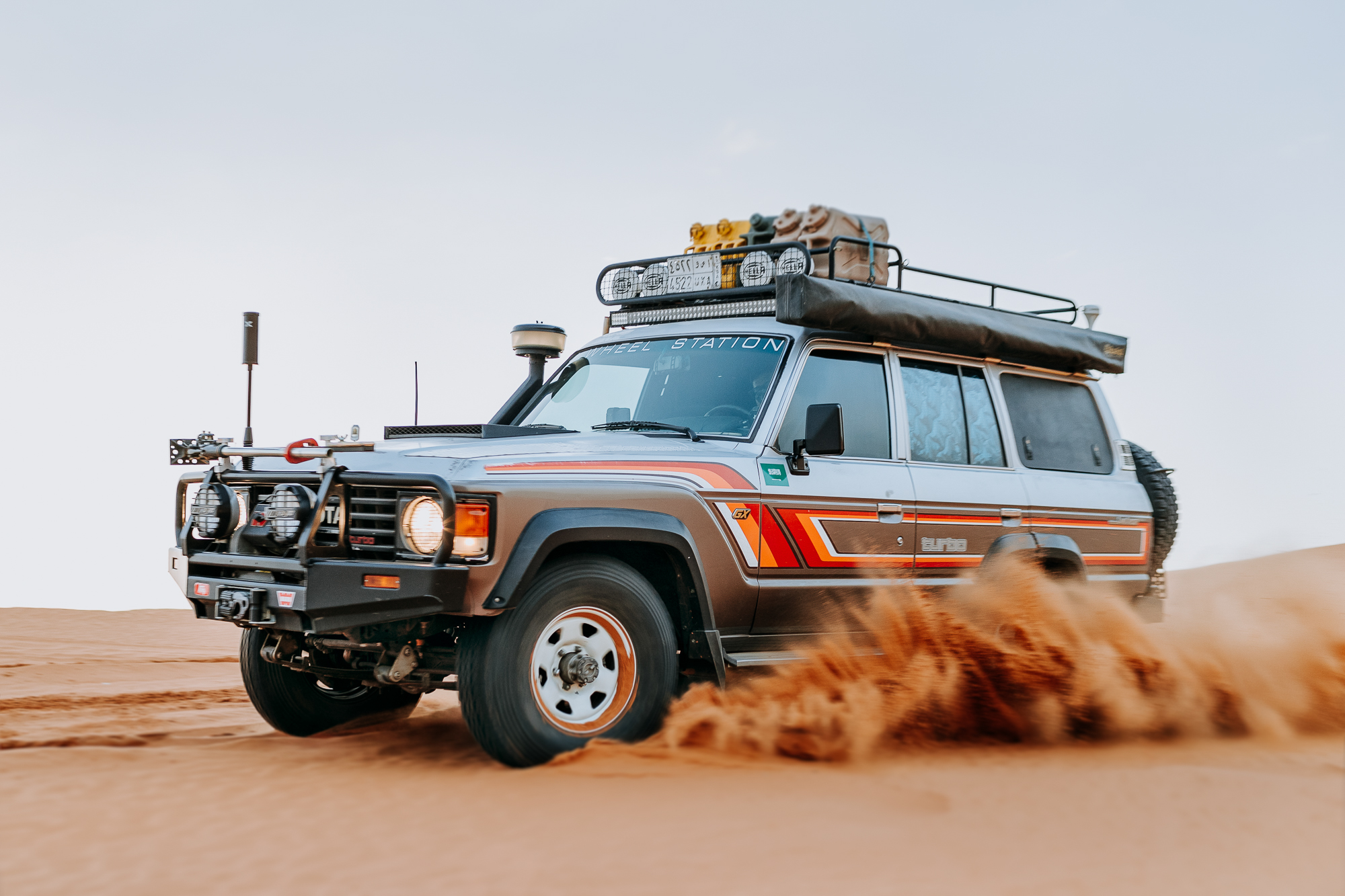Editor’s Note: This Toyota FJ62 article was originally published in Overland Journal’s Spring 2023 Issue.
Photography by Richard Giordano
Few can say they’ve purchased a vehicle from the Saudi royal family; even fewer own a Land Cruiser as meticulously spotless as off-road and automotive shop owner Luai Alsheheli’s. “This 60-Series Land Cruiser was one of many that King Fahd [bin Abdulaziz Al Saud]’s palace was selling in 2016,” he tells me, voice crackling over the radio. “They brought it into the shop to have it looked over. I offered a price; they said ‘okay,’ and here we are, six years later.” Alsheheli is the co-founder and owner of 4 Wheel Station, a 4×4 shop based in Riyadh, Saudi Arabia, and this 1985 Toyota FJ62 Land Cruiser has become his well-suited overland adventure vehicle.
To a Canadian whose closest connection to royalty is flipping through my grandmother’s old issues of Hello! Canada, it is utterly fantastical to have purchased a mint-condition Toyota FJ62 from the House of Saud. Luai seems nonchalant about the whole thing. “I don’t know why the palace purchased the Land Cruiser [initially]. For its time, it was top spec with a sunroof, dual air-conditioning (a super-rare option), and a deluxe interior. The original seats are awesome. I still have them wrapped and stored in my warehouse. They look ’80s cool.”
I’m riding in the passenger seat of a V-8 swapped 105-Series, following Luai in his 60, returning to Riyadh after several hours of fun in the desert on the city’s outskirts. The glow of red brake lights and a watercolor-hued sunset fill the windshield—the kind that exists only in the desert but is enjoyed even on a traffic-filled highway. From the rear, the Toyota FJ62 looks like many I’ve seen before—an eclectic sticker collection fills the back windows, spare tires and a braai grill are fitted to the Kaymar bumper, and an Inti roof rack holds fuel and water jerries. But this is where the similarities end.
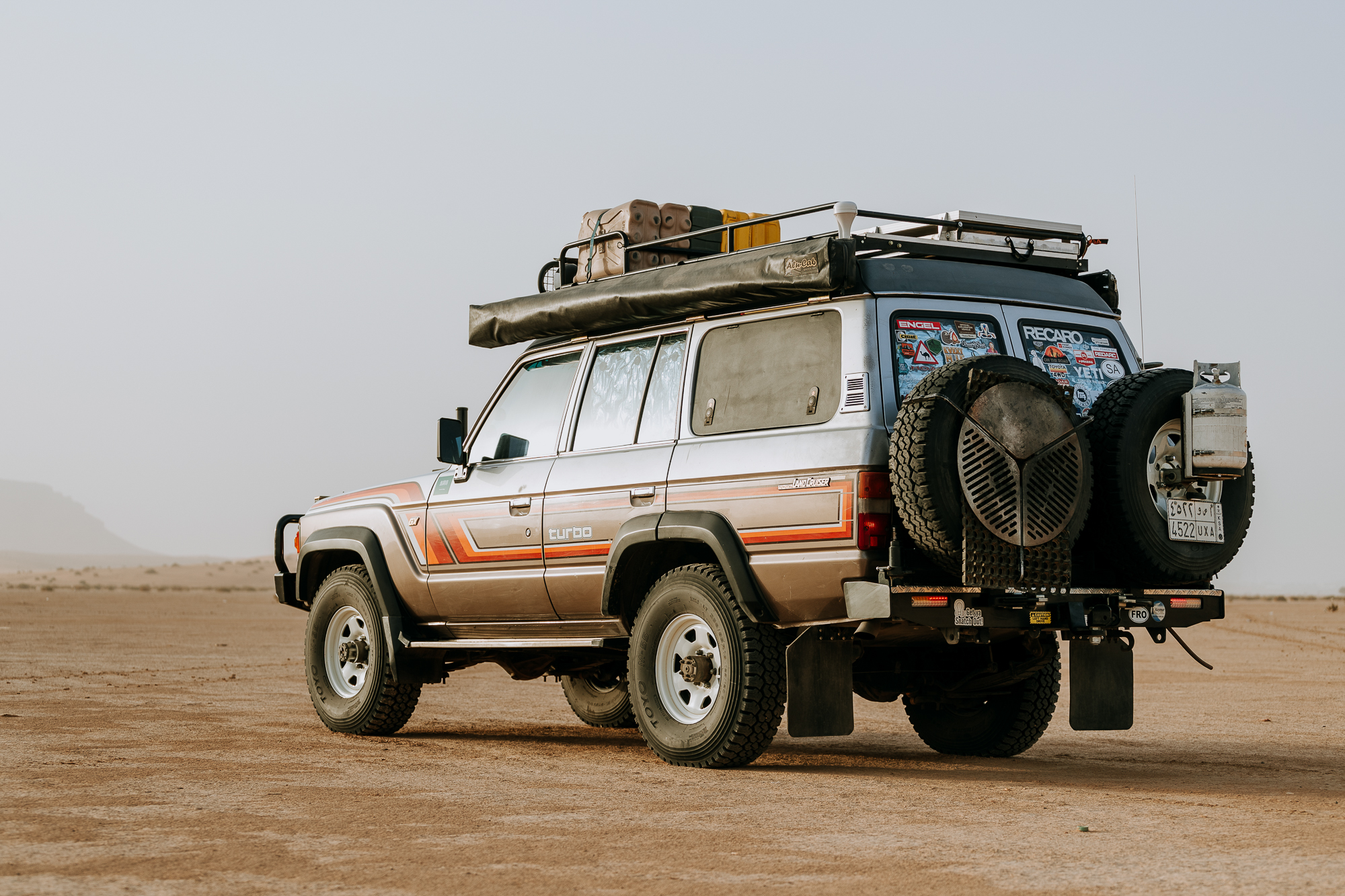
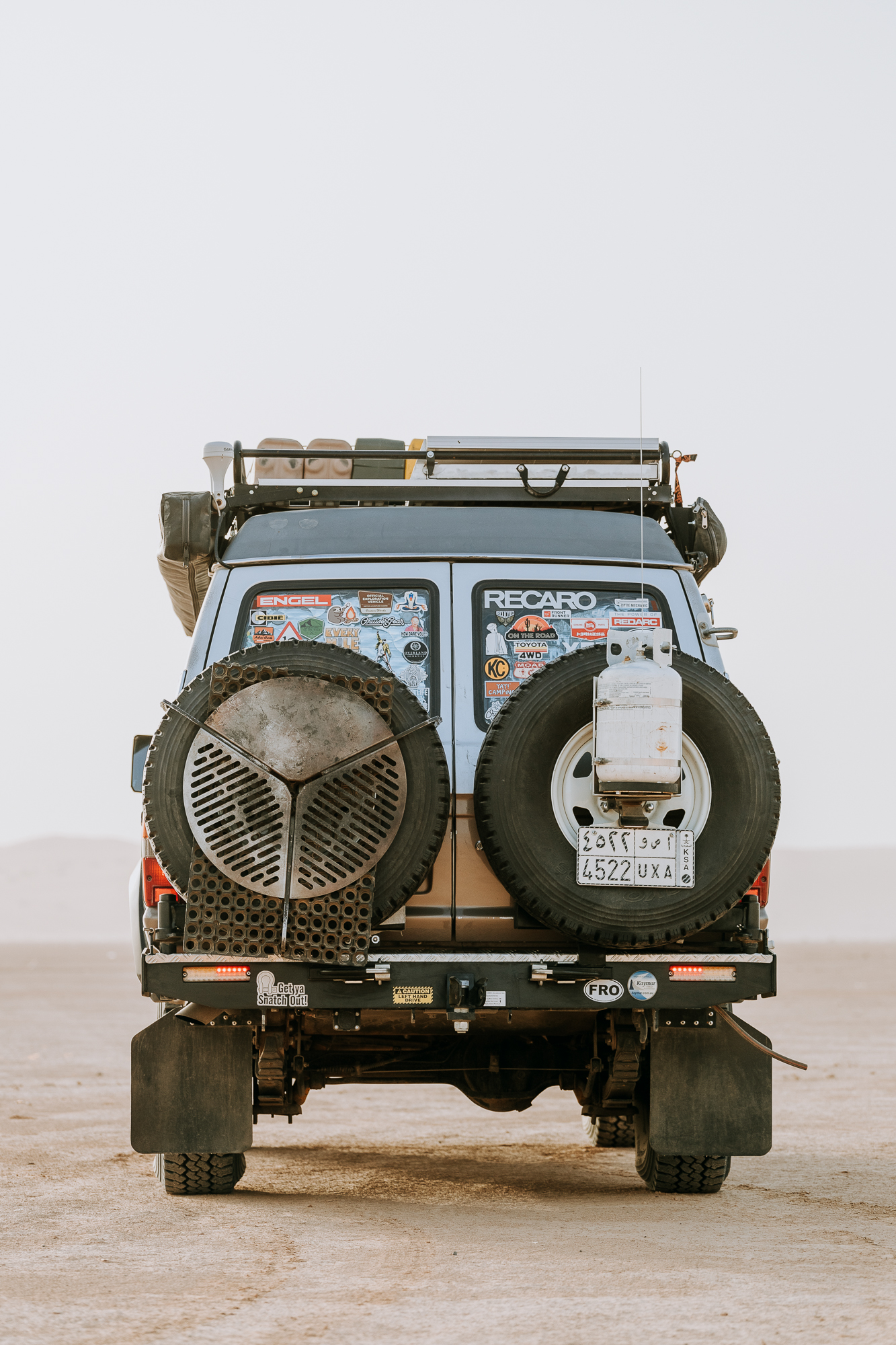
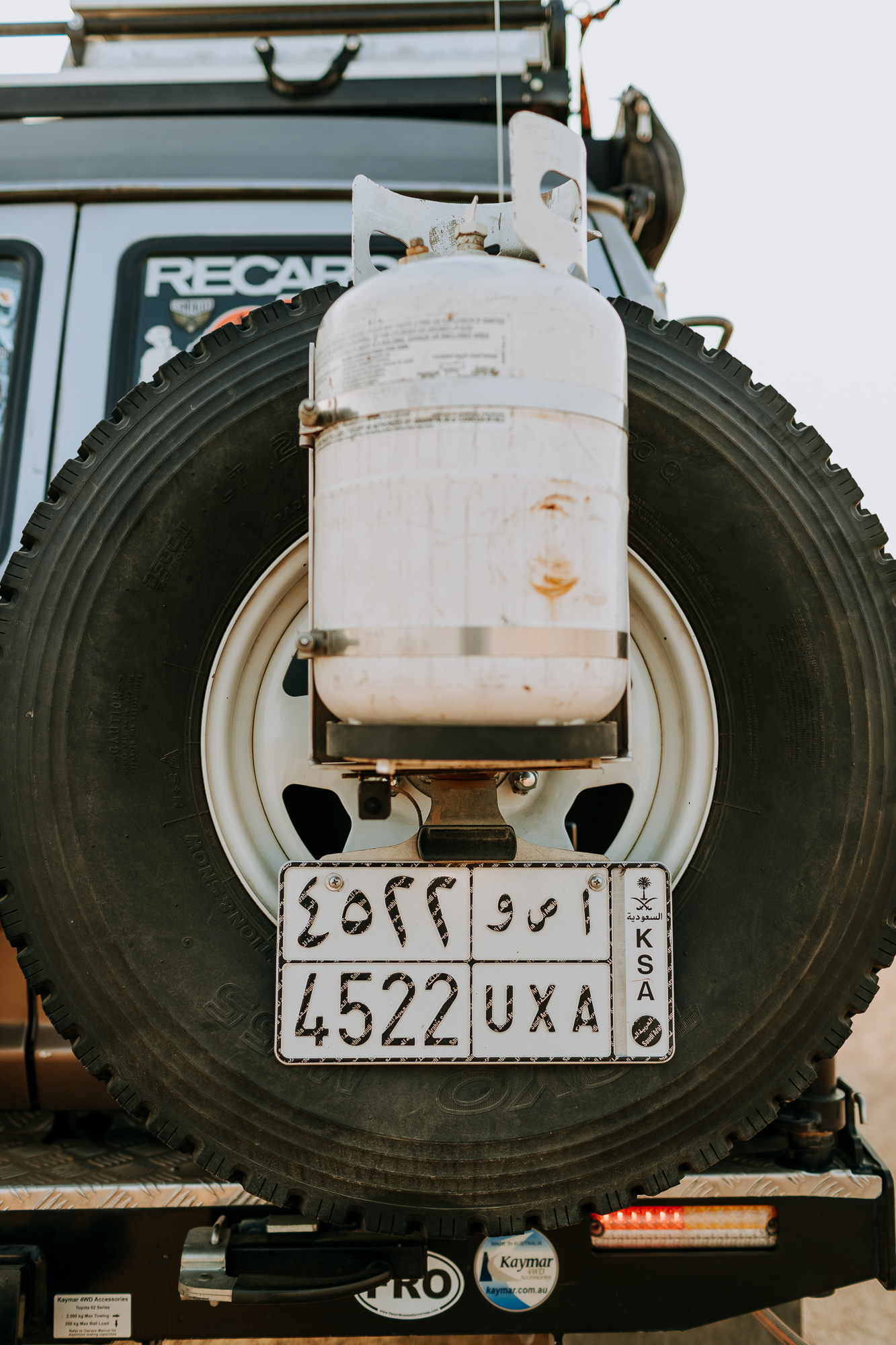
A reflection of its owner, the truck fuses East with West: a sticker of Freddy Mercury pumping his fist here, a Saudi national flag sticker there, a Pike National Forest patch, and license plates written in Arabic script. Luai was born in the US, completed middle and high school in Saudi, and returned to America to graduate with a computer engineering degree. Formerly a Royal Saudi Air Force member, he left to pursue his dream of modifying adventure vehicles and opening his own shop. Influenced by off-pavement culture in both America and Saudi, Alsheheli prefers Jeeps for technical driving and Land Cruisers for long-distance travel. Soft-spoken, spectacled, and kind, Luai was a generous host during our time in Saudi, patiently and enthusiastically answering my barrage of questions about culture, home, family, and, of course, his FJ62, “Rafiki.”
The original intention behind the build was travel. “I also liked the character,” he laughs. Fair enough, the Creamsicle-striped turbo livery and classic vintage shape of the 60-Series Cruiser are what dreams are made of, and I’m not the only one who thinks so. The exterior paint is faded and a bit rough, something which, to my surprise, was done on purpose. “We deliberately tinned and weathered the car because I was getting a lot of requests to sell it,” Luai notes. “Customers, friends, even strangers would leave their number on the windshield in hopes I would call and discuss a sale.” Like bees drawn to sweet nectar, the vehicle was in such mint condition it attracted attention everywhere it went. Luai, tired of turning down prospective buyers, weathered the paint. “That made it go under the radar.”
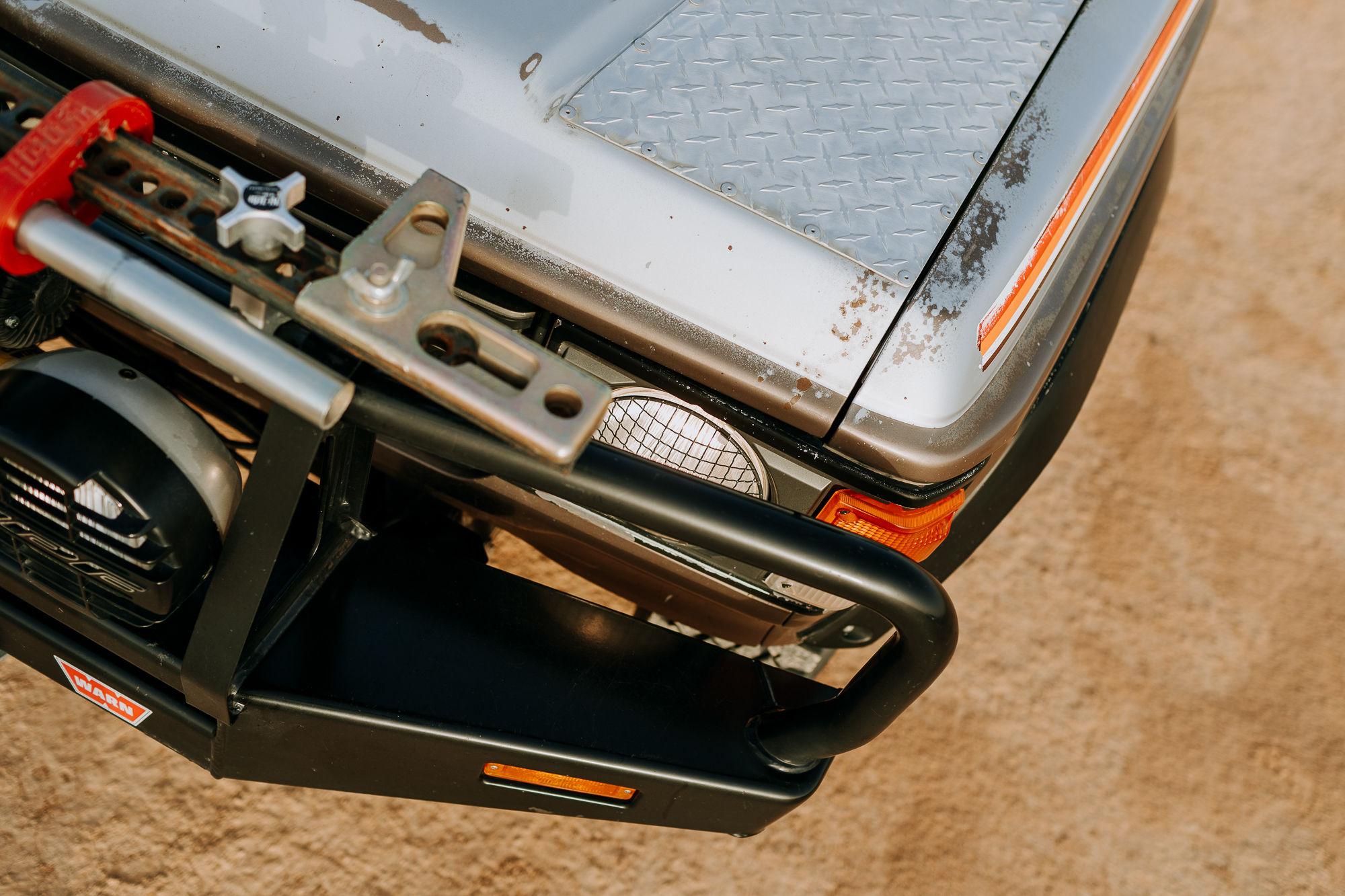
From the factory, the Toyota FJ62 sat low and would need additional weight management for ample water and fuel storage and a platform in the back, so Alsheheli installed a 2-inch Old Man Emu lift with a max load rating and airbags in the rear. “This vehicle used to be the guinea pig of our workshop,” he says. “We’d shop at suppliers, do independent testing, and decide if we wanted to use [the products].”
Now for the fun stuff. The 60-Series underwent a 1HD-FT engine swap, which Luai says was done to extend the range and amplify power. “This is the last mechanical Land Cruiser engine that Toyota made. We took it completely apart and built it with original OEM parts from the ground up, including turbo, injectors, the whole thing.” A new top-mounted HPD intercooler from Australia, an extra fuel filter, a water separator, and an emergency shut-off valve round out the engine enhancements. Admittedly, the 1HD-FT is one of Luai’s favorite parts of the build. “Even the noises [the truck] makes, the clunks, the little weird stuff—I like it. We’re very proud of the stuff we’ve built.”
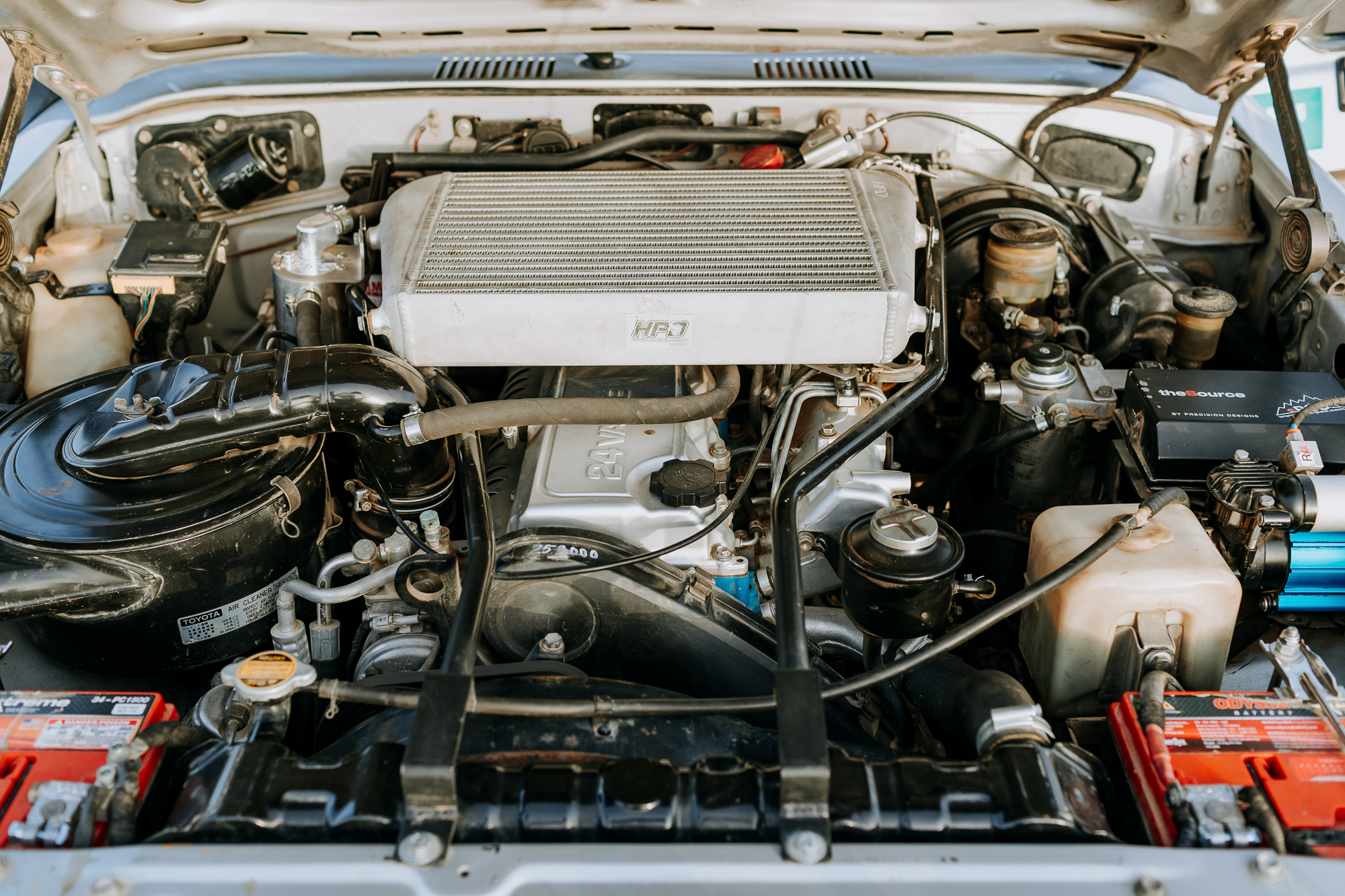
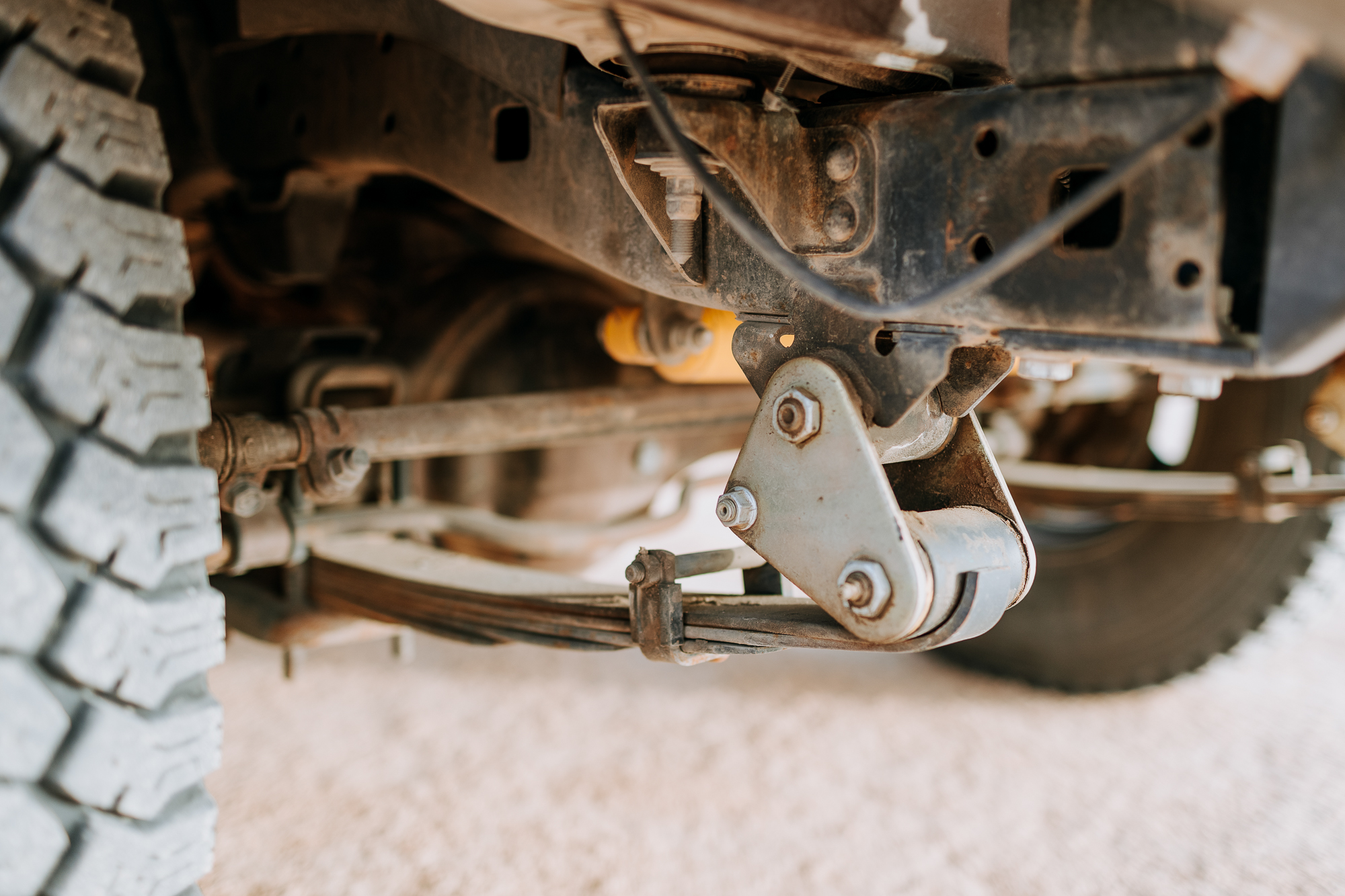
The team at 4 Wheel Station fabricated a water tank, drawer system, camp table, seat and fridge brackets, and a 160-liter fuel tank made of galvanized steel. Luai explains, “It sits in the back, behind the rear axle. Right now, at half empty, I can probably get a 1,200- or 1,500-kilometer range out of it.” When pulling his fully loaded AT Overlander Adventure Trailer, primarily used for trips in the country’s northern region, the range decreases to approximately 1,000 kilometers. “When we go north, there is a larger group with us, and we’re hauling a lot more food, gear, and water. The trailer hasn’t let me down yet; it’s fantastic and the perfect height for the rooftop tent.”
Much like the well-loved braaiin South Africa or modified fender flares and 44-inch Nokian Hakkapeliittas in Iceland, there are cultural and environmental considerations unique to overland travel in Saudi Arabia. Luai says when it came to modifications, the first priorities were ample water storage, fridges, and lights. I assumed generous water capacity was just good practice in a bone-dry climate—but, as it turns out, water is crucial to Muslims for several reasons. “People are praying five times a day and use water for that. It just boils down to how long you want to stay off the grid.” No pun intended.
The practice of wudu, or Islamic purification, involves washing the head, face, hands, arms, and feet with a small amount of water before prayer. Water is also used for hygienic reasons, boiled often for coffee and tea, and to supplement the local diet, which relies on the wet stuff for rice and shared meals. Luai notes it is typical for travelers to carry at least 60 liters of water for this reason. His Cruiser features a custom 200-liter aluminum onboard freshwater tank, two jerry cans, and 10 liters of storage within a 12-volt electric water heater. A Pura UV filtration apparatus, a Shurflo pump, a mix valve to control temperature, and gauges to monitor consumption round out the vehicle’s water system.
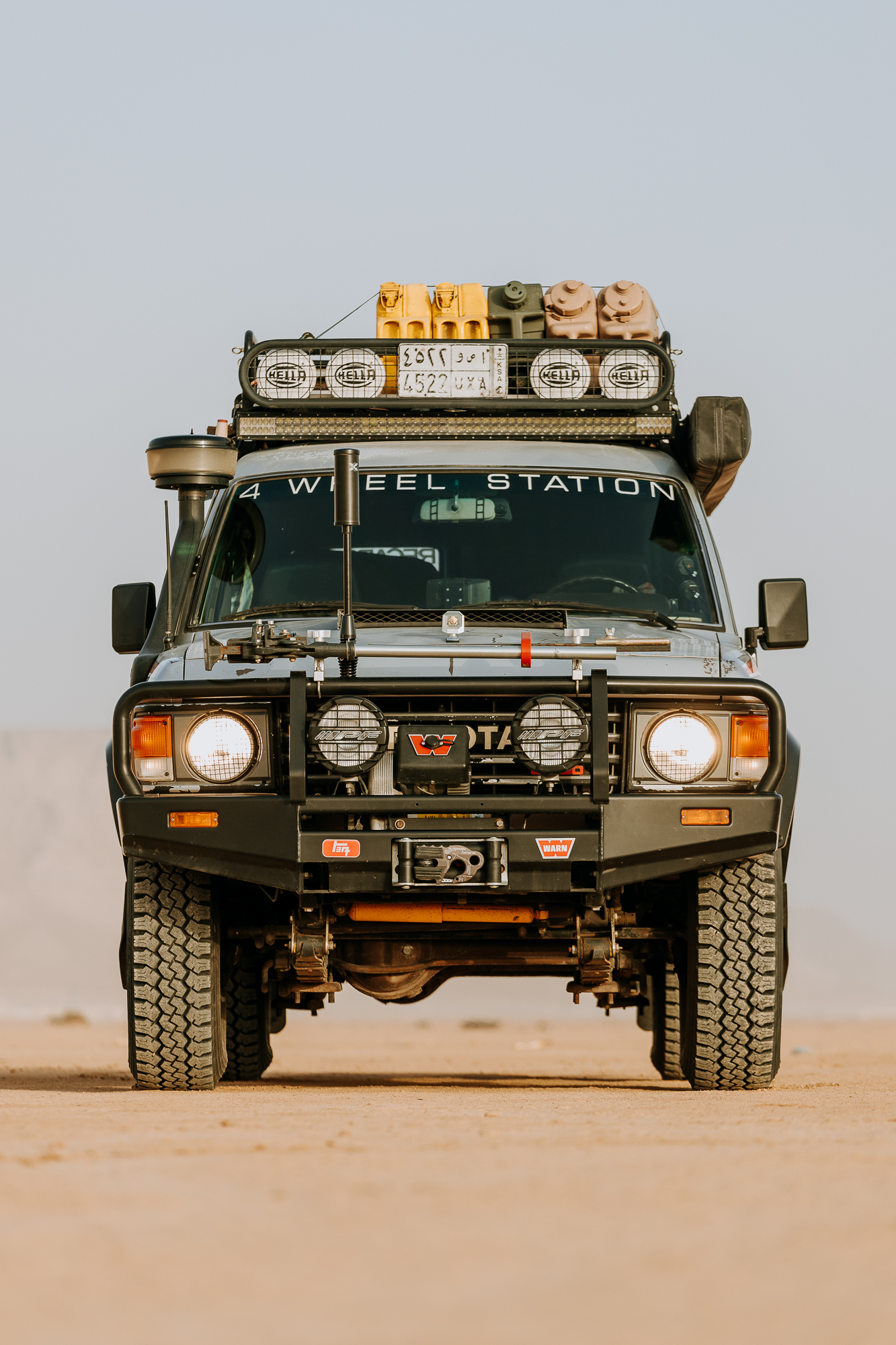
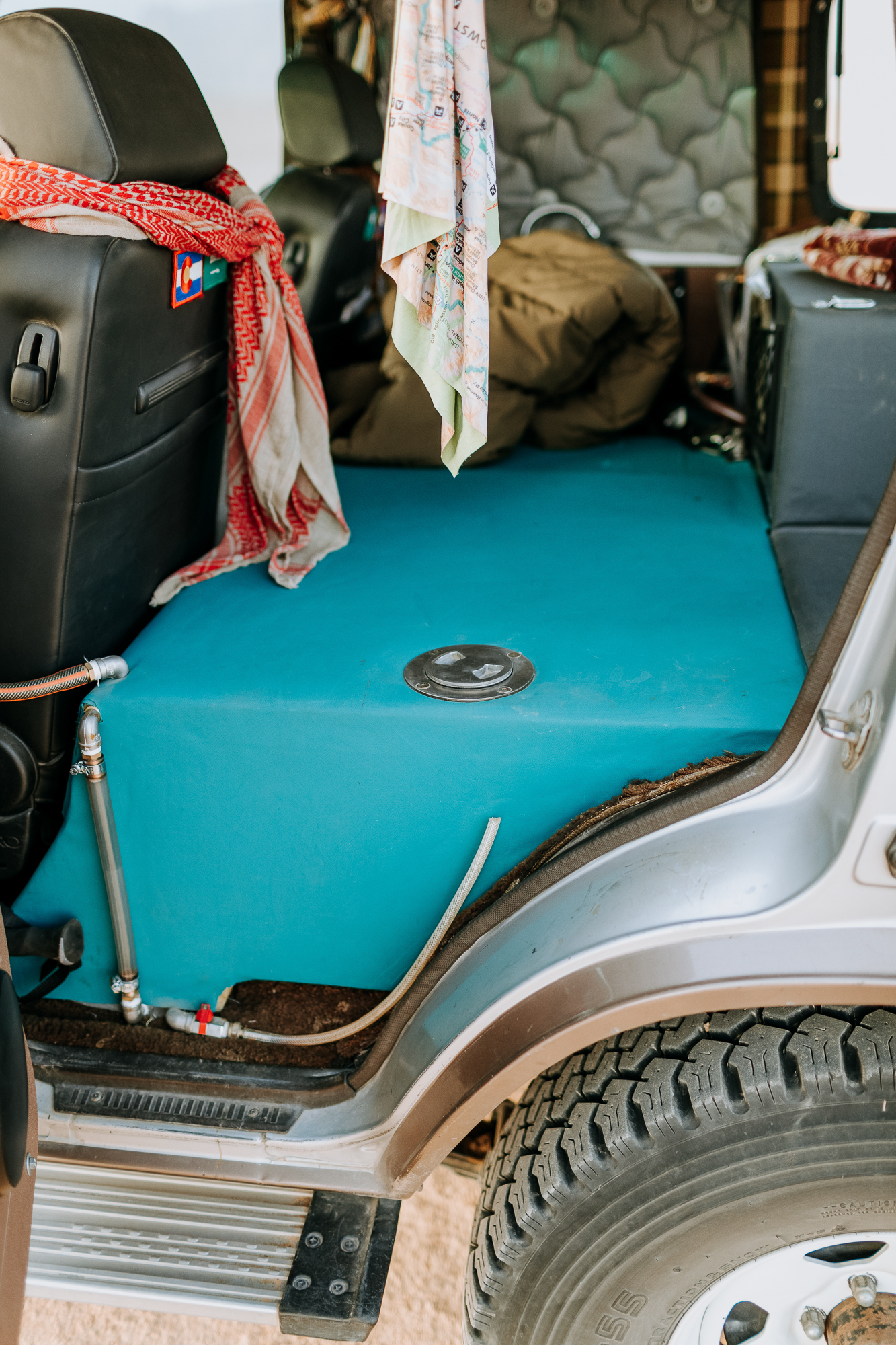
Touring in Saudi is hardly a solo affair. “You don’t typically see people moving in groups of two or three,” Luai says. “Normally, it’s a minimum of 10 to 15.” Meals are shared, so to keep hungry folks happy, the 60-Series is equipped with a Partner Steel stove, AT Overland propane tank, and two fridges: an 11-liter Dometic and a 42-liter Engel. Like most Saudis, Alsheheli and his travel companions stay up well into the night, so lights are essential—not just for driving but also for camping. The FJ62 often acts as the central hub, illuminating the inky desert sky thanks to Rigid LED scene lights, a 50-inch Rigid LED light bar, and four Hella halogen roof rack lights. Above the Warn 8274 winch is a set of IPF off-road halogen lights bolted onto the ARB bull bar front bumper, while 7-inch Cibie headlights complement the retro feel of the truck. In-cab control of the lights is courtesy of an sPod switch panel.
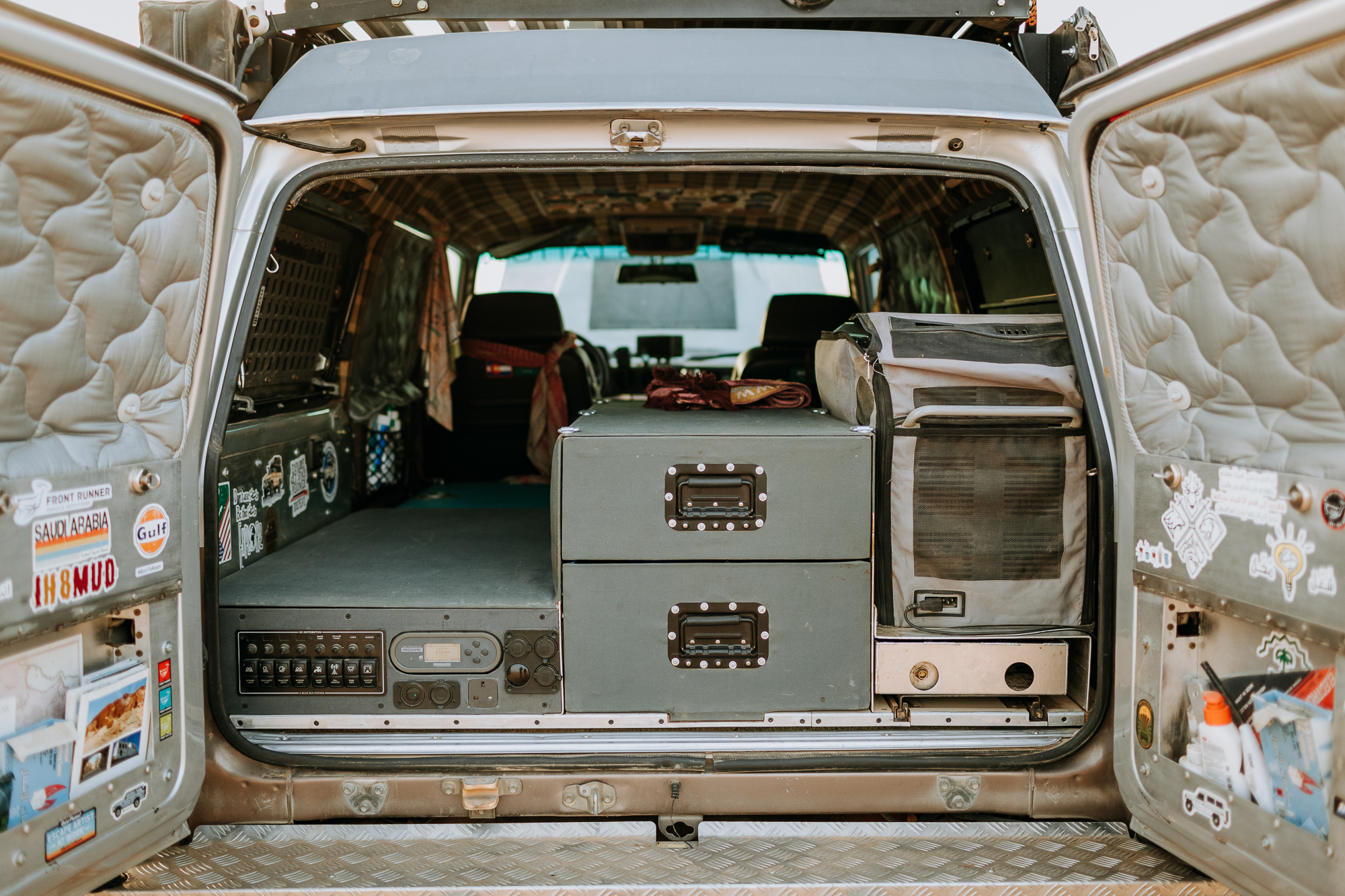
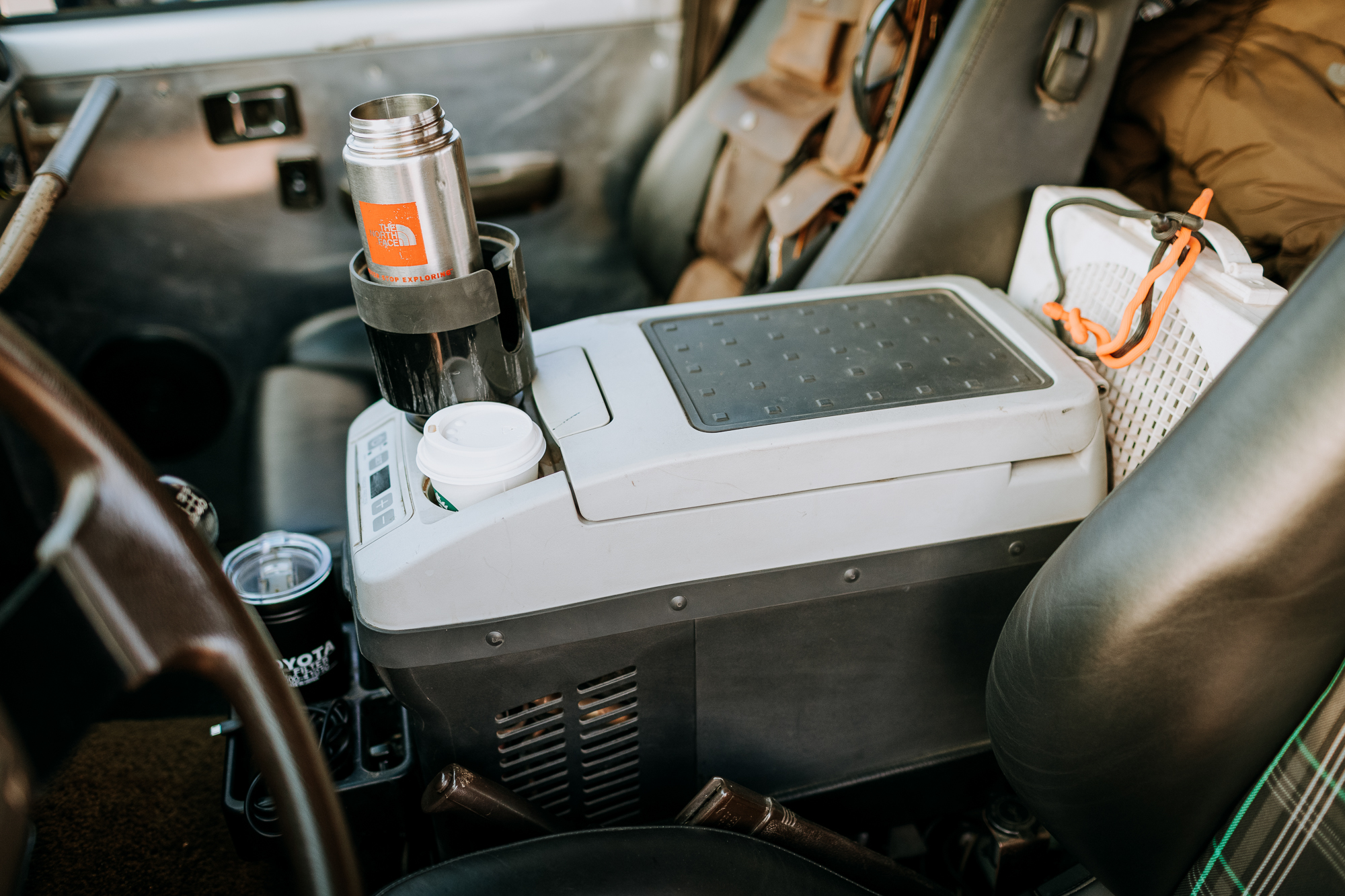
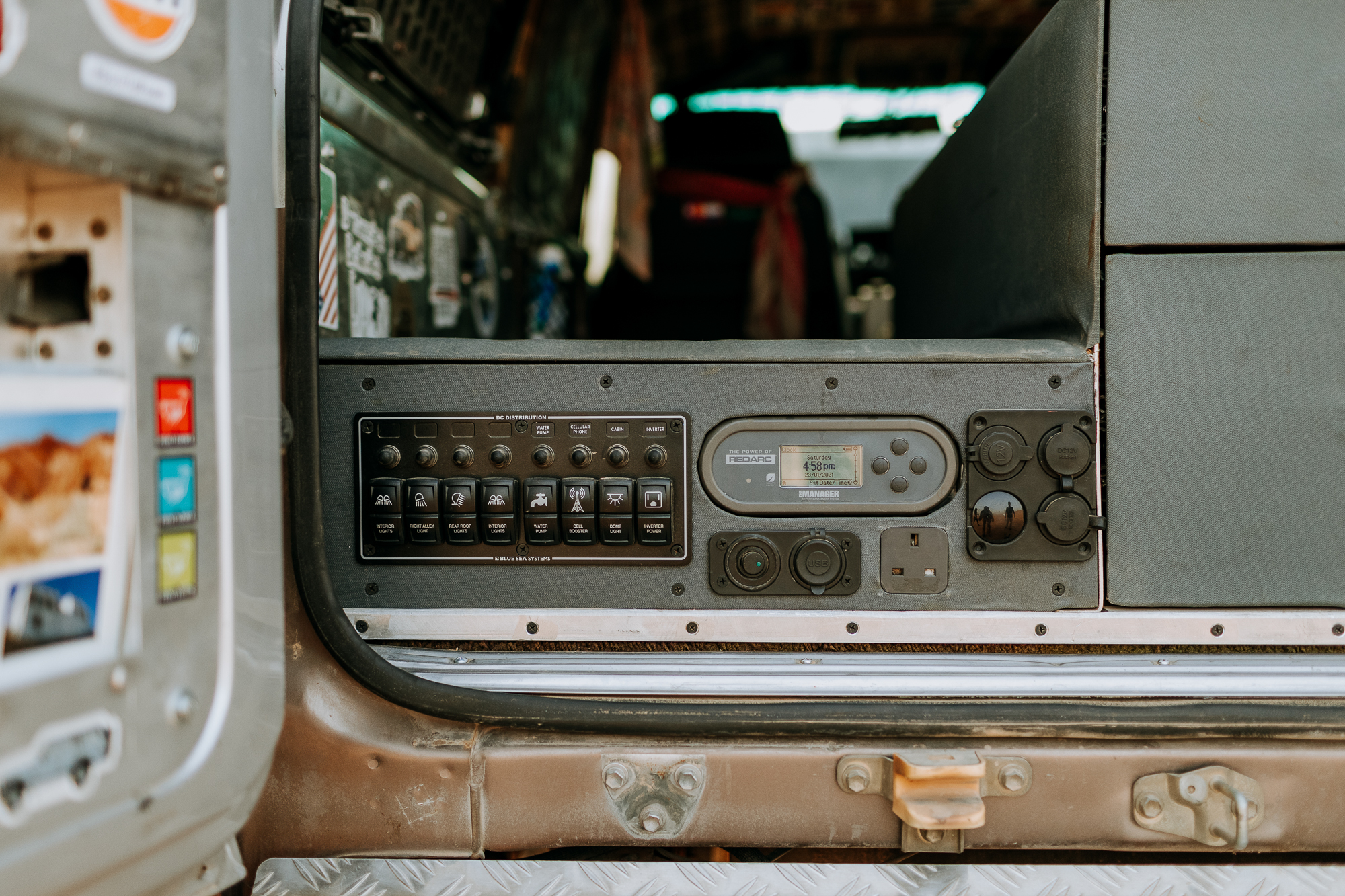
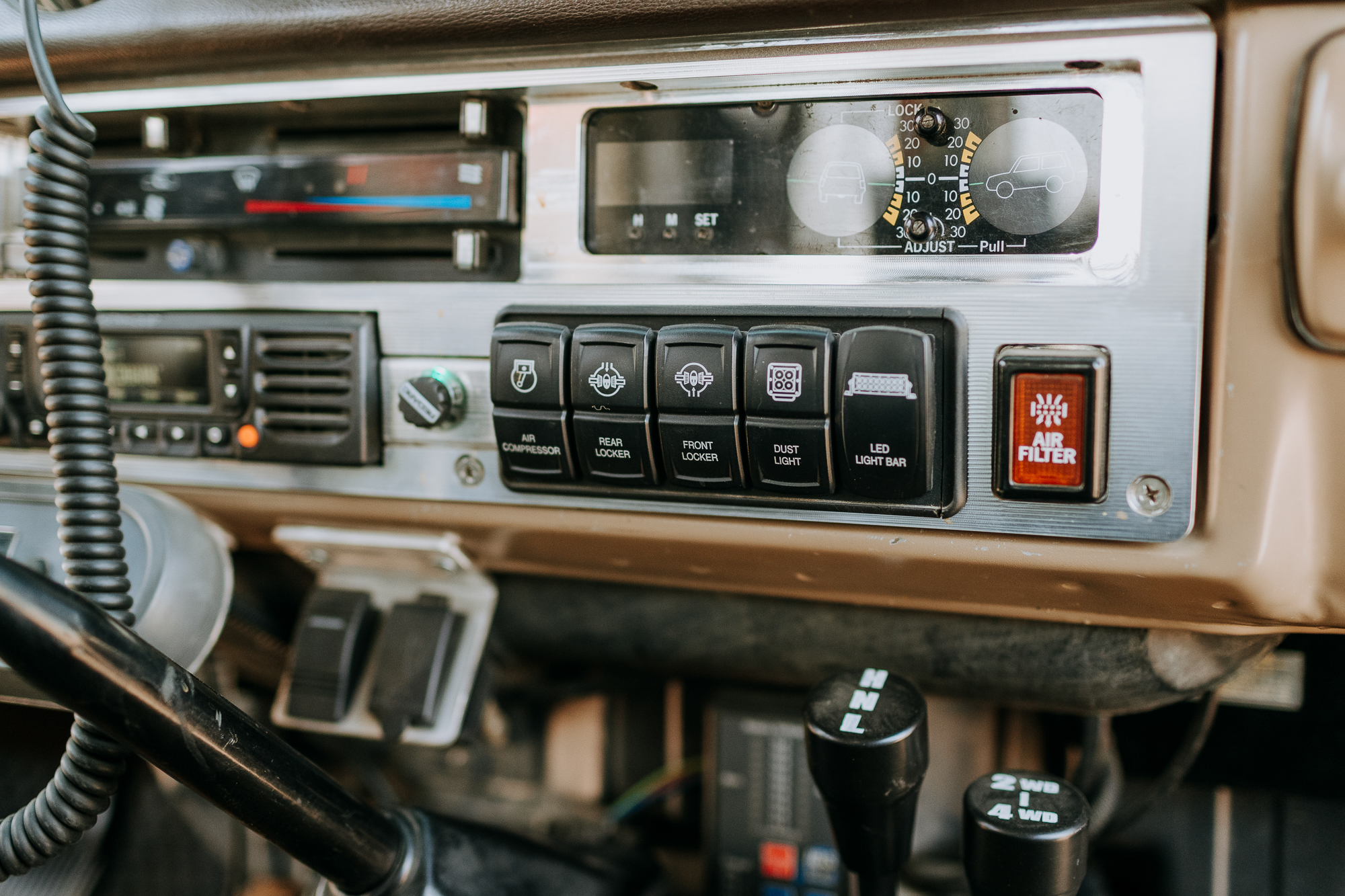
A host of aftermarket accessories require a robust electrical and charging system. Remember, Luai and his team at 4 Wheel Station put many products through the wringer before committing. “We didn’t tell Redarc we wanted to work with them until we purchased the products and did independent testing,” he notes. “I tried a lot of different systems and went back to the Redarc stuff because it takes the guessing out of it.” Currently running the Manager 30 electronic management system, Luai also opted for two 100-amp hour lithium batteries, a whopping 3,000-watt, 220-volt inverter, two Odyssey AGM starting batteries, and a 150-watt fixed solar panel. A Blue Sea Systems control panel integrated into the rear platform manages the lights, water pump, inverter, and a Cel-Fi phone booster, which Alsheheli is currently testing.
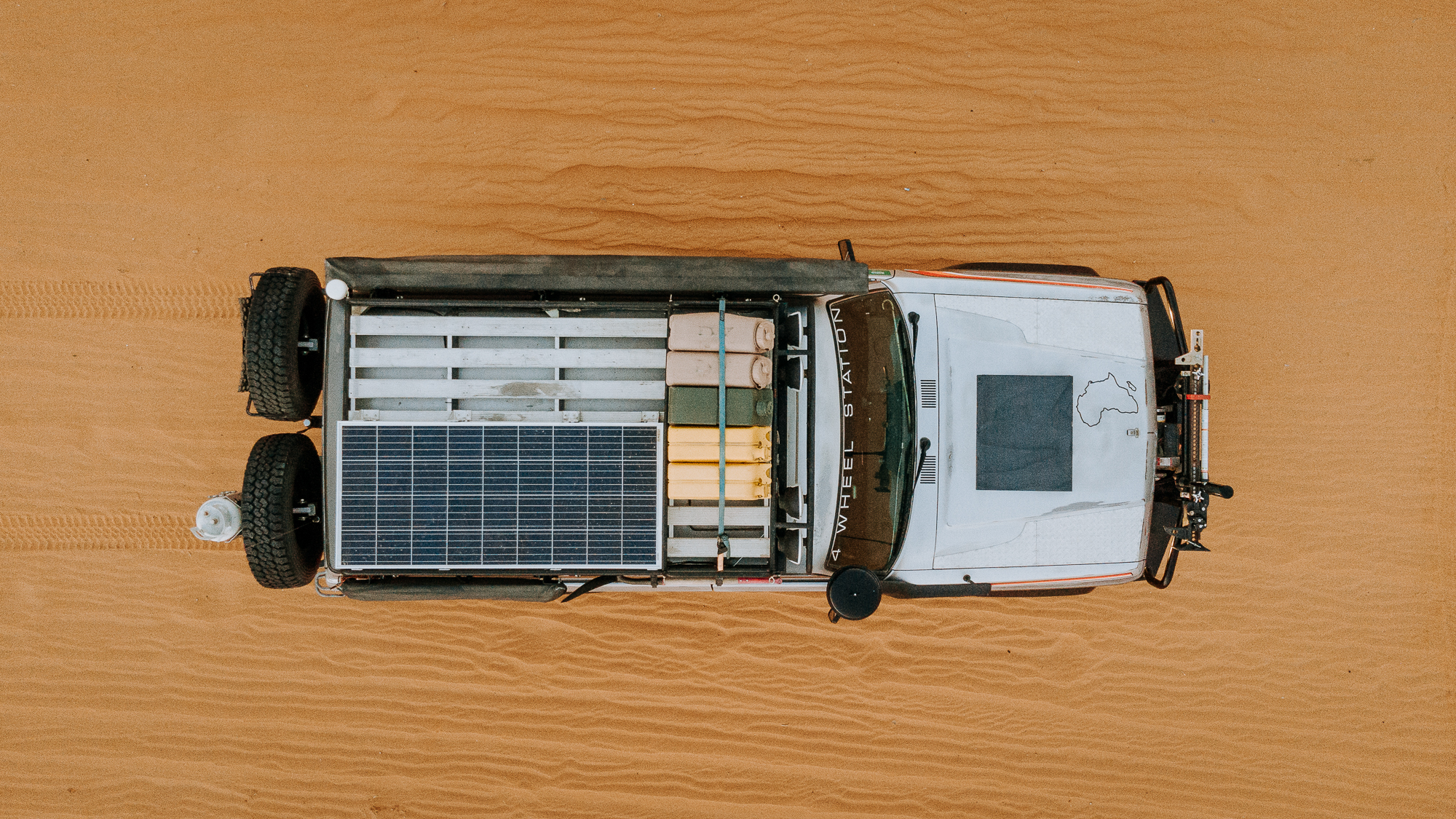
Bumpers and snorkels are cool, but one-of-a-kind details make the heart pitter-patter, and this Toyota FJ62 has plenty of them. A set of turquoise and black tartan Recaro touring seats make space for a draped leather organizer featuring perfect snapped pockets housing personal items. Around the driver-side headrest is a knotted red and white shemagh, which Luai says he uses for multiple purposes, including donning while doing vehicle maintenance on dusty days. Enhanced by a patch panel with choice destinations and bands (AC/DC, the Beatles, and Moab—nice), the caramel and chocolate-checkered headliner is just plain fun. Hot coffee is stored in an insulated Toyota oil filter mug, which rests comfortably next to an empty Starbucks to-go cup. The final flourish: snow-white 16×6 OEM steel wheels hugged by a set of Toyo M55 255/85R16 tires.
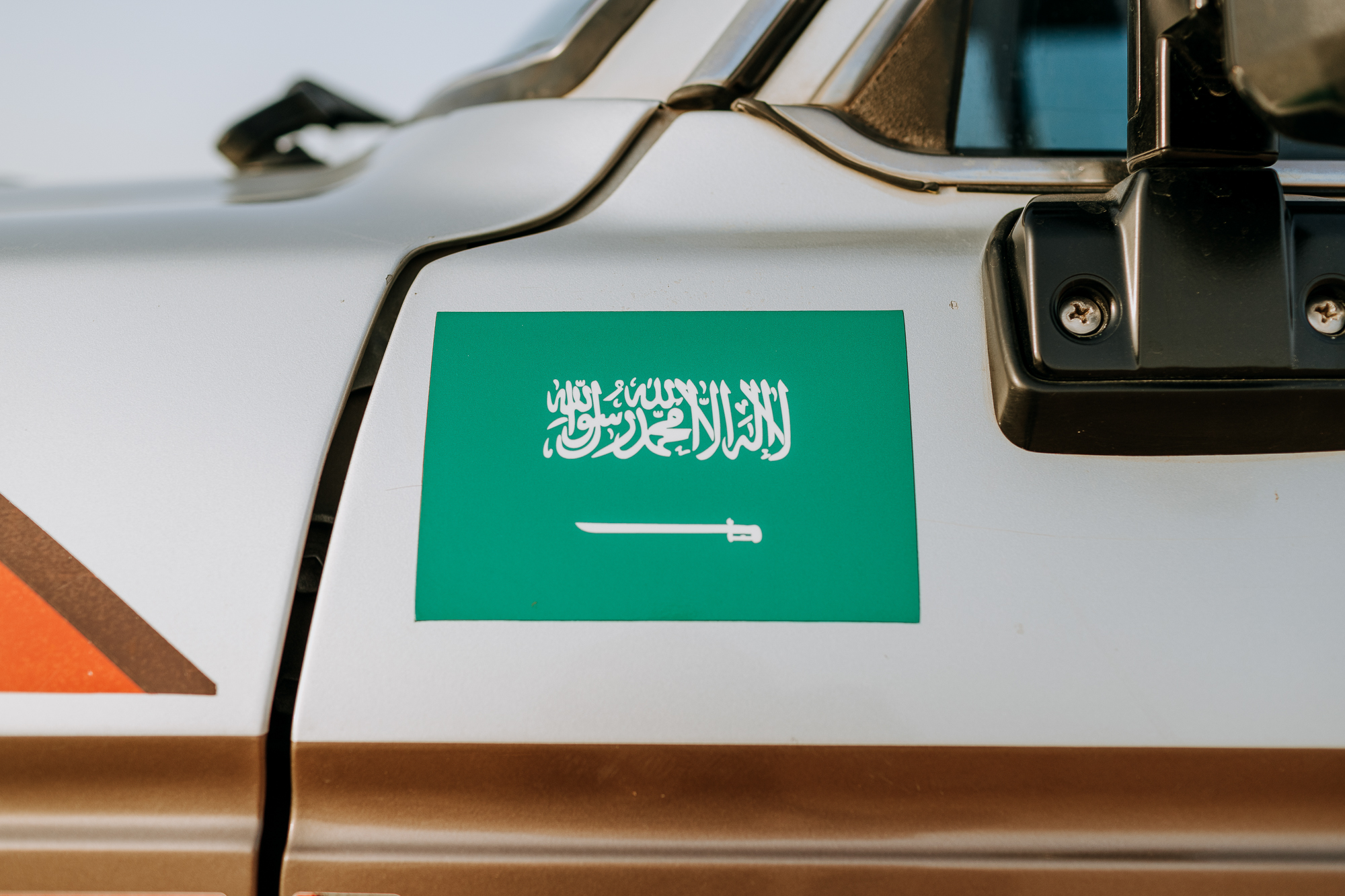
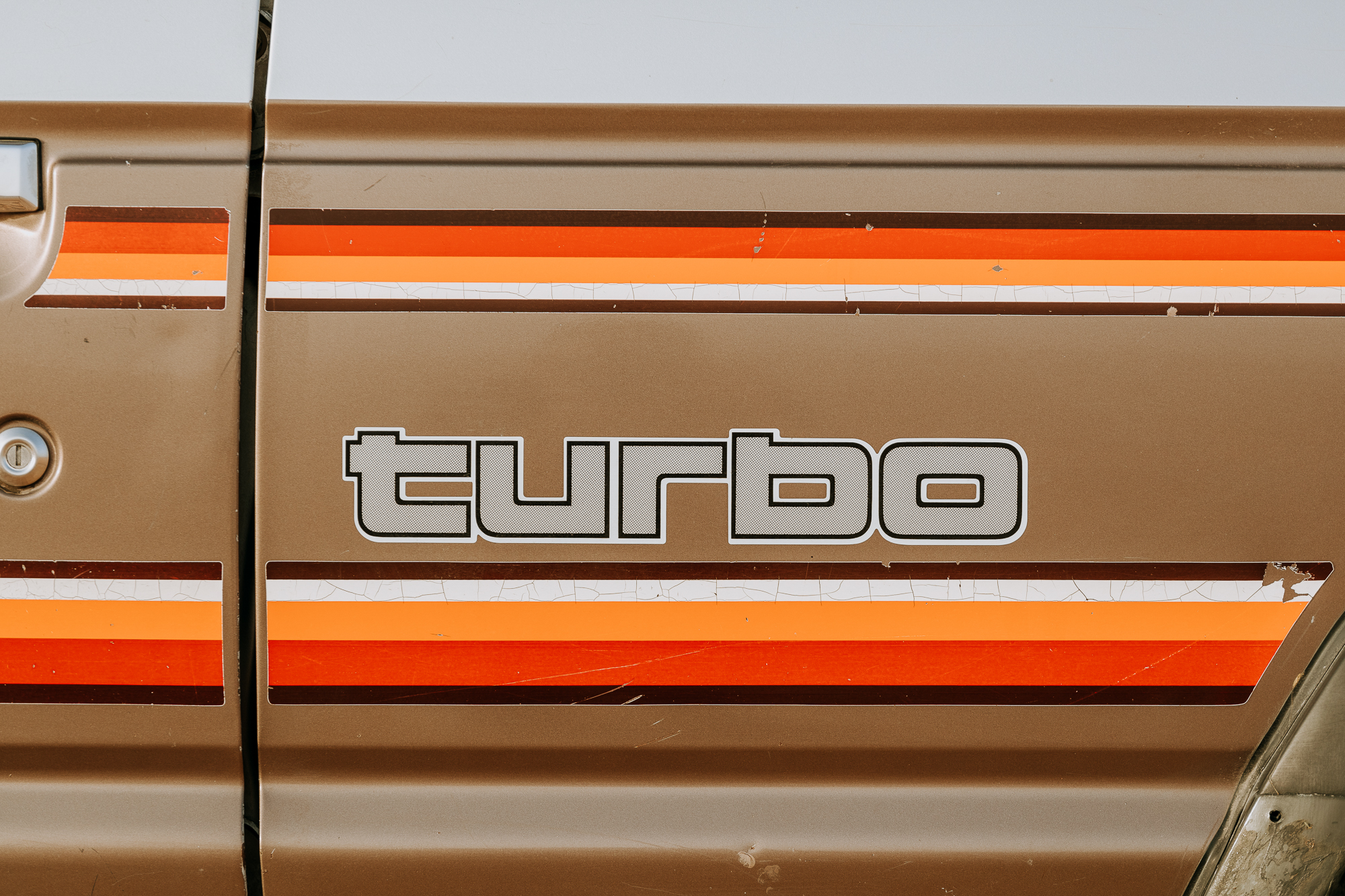
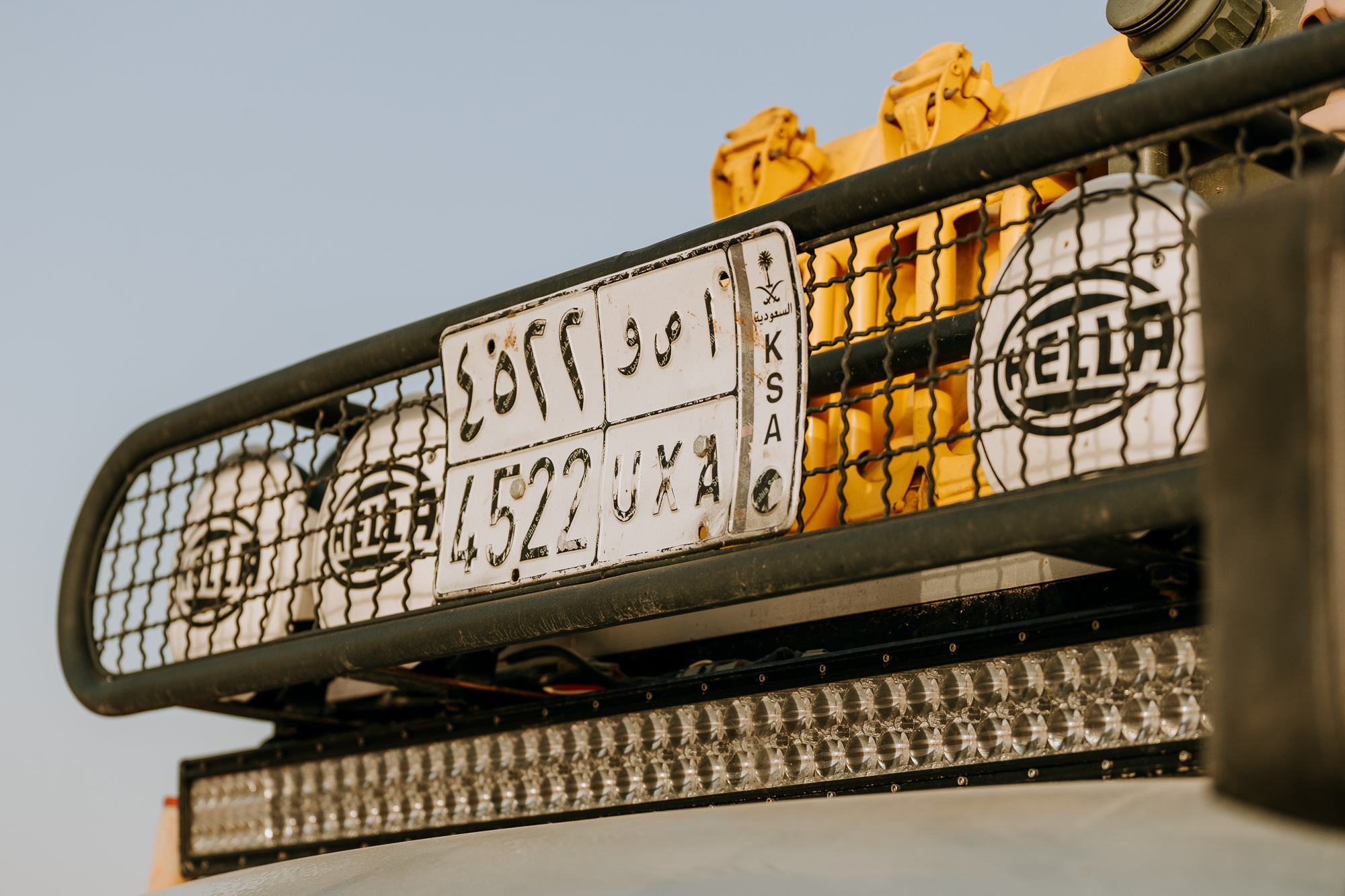
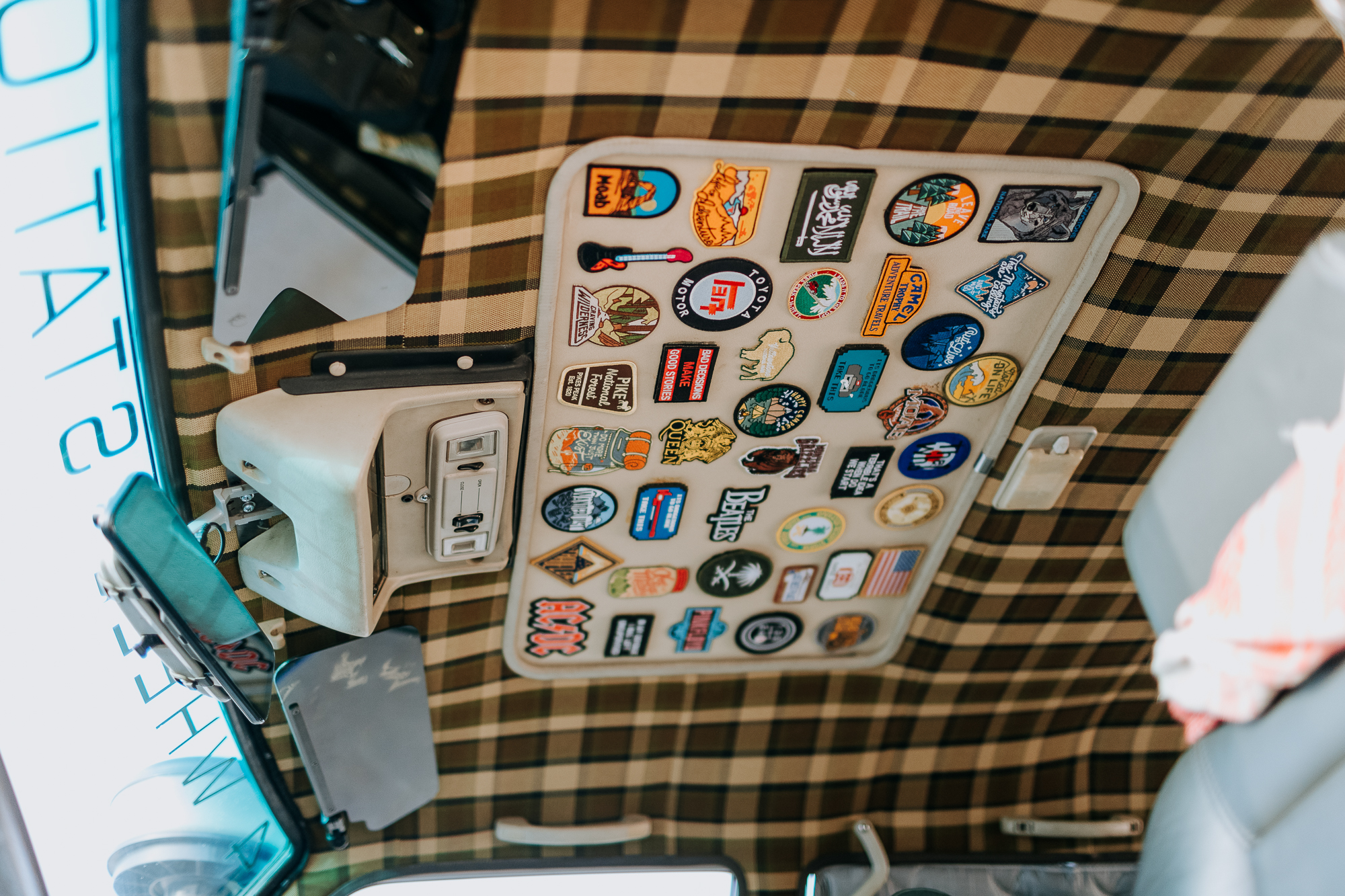
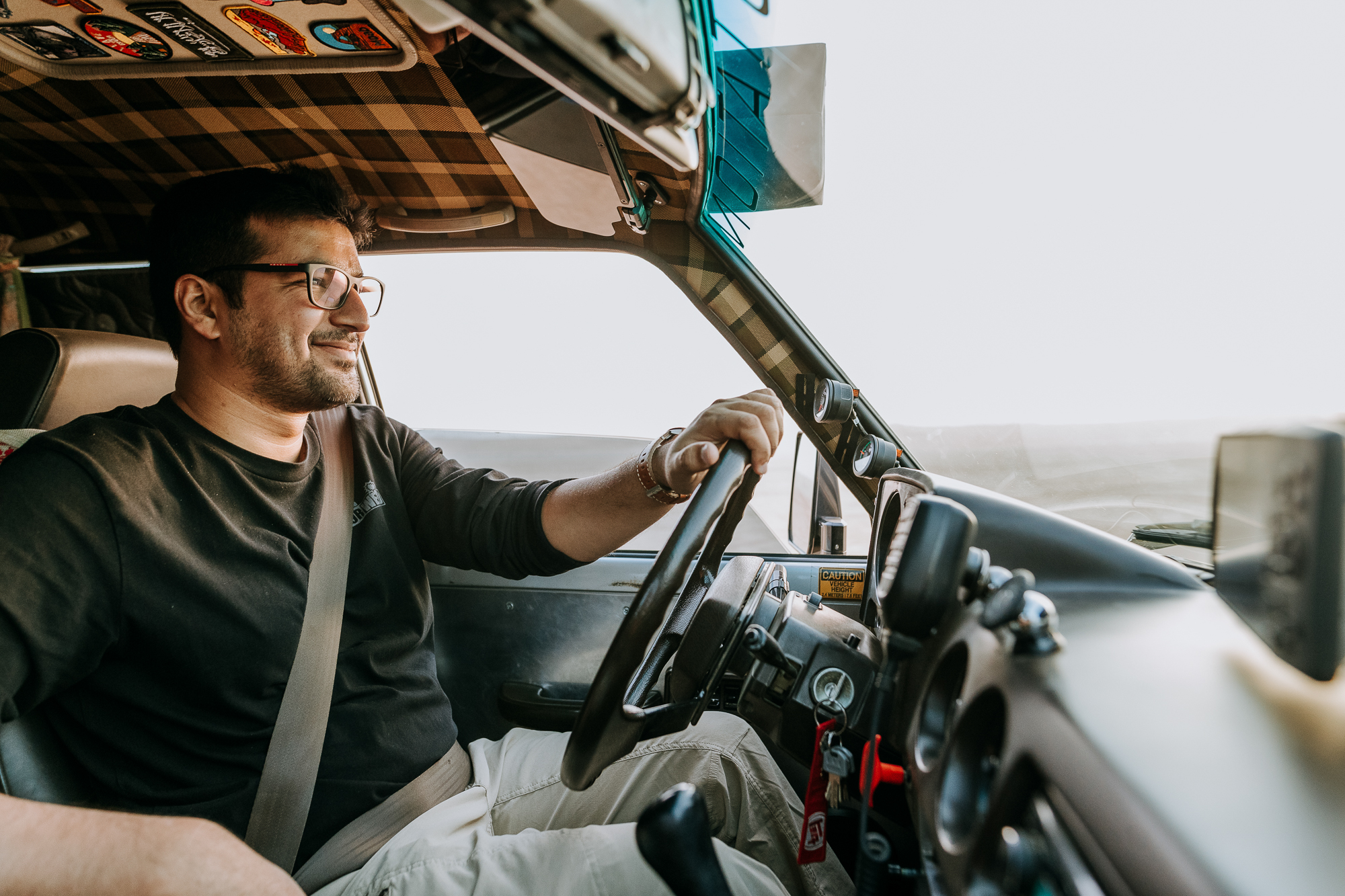
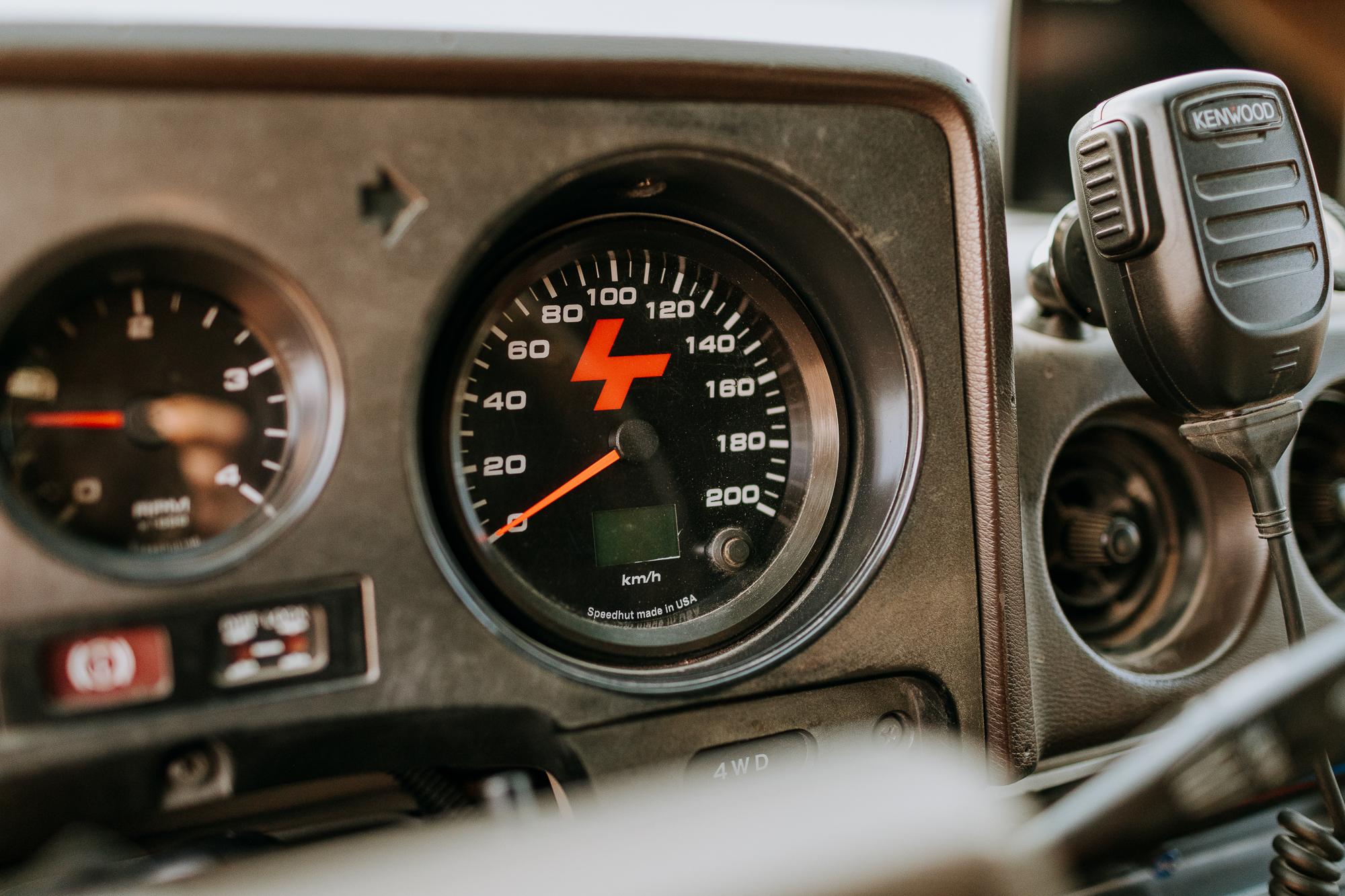
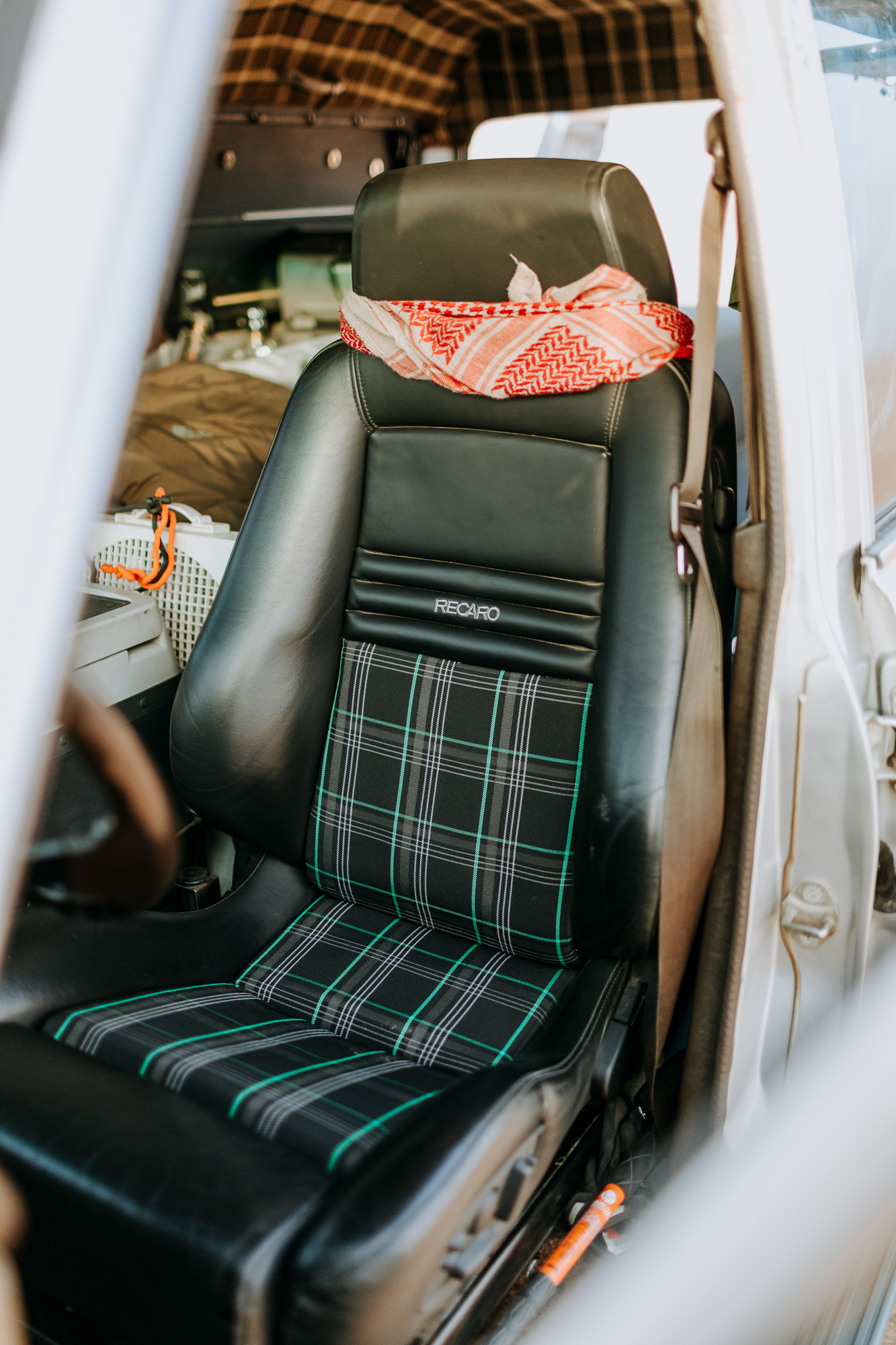
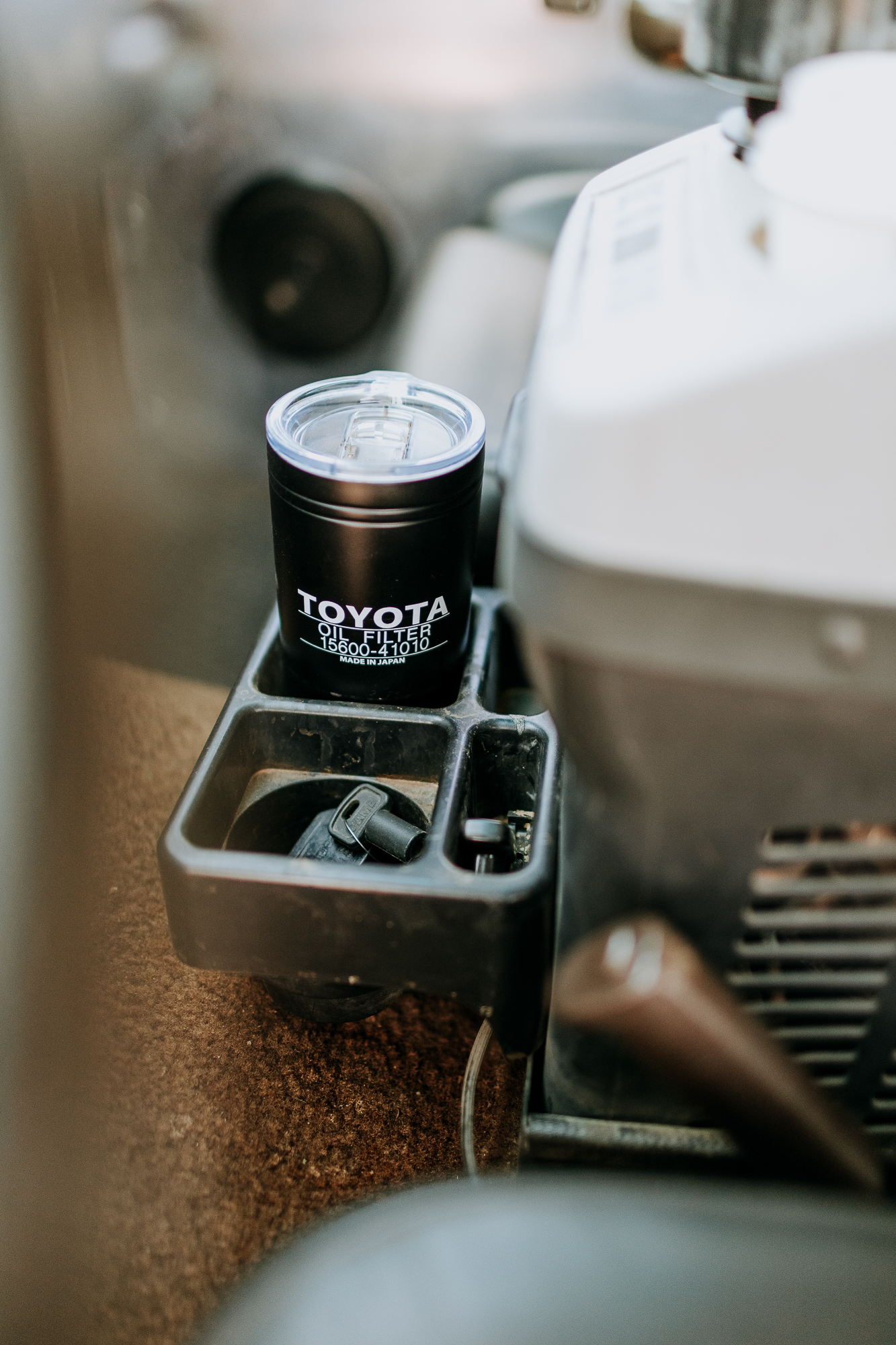
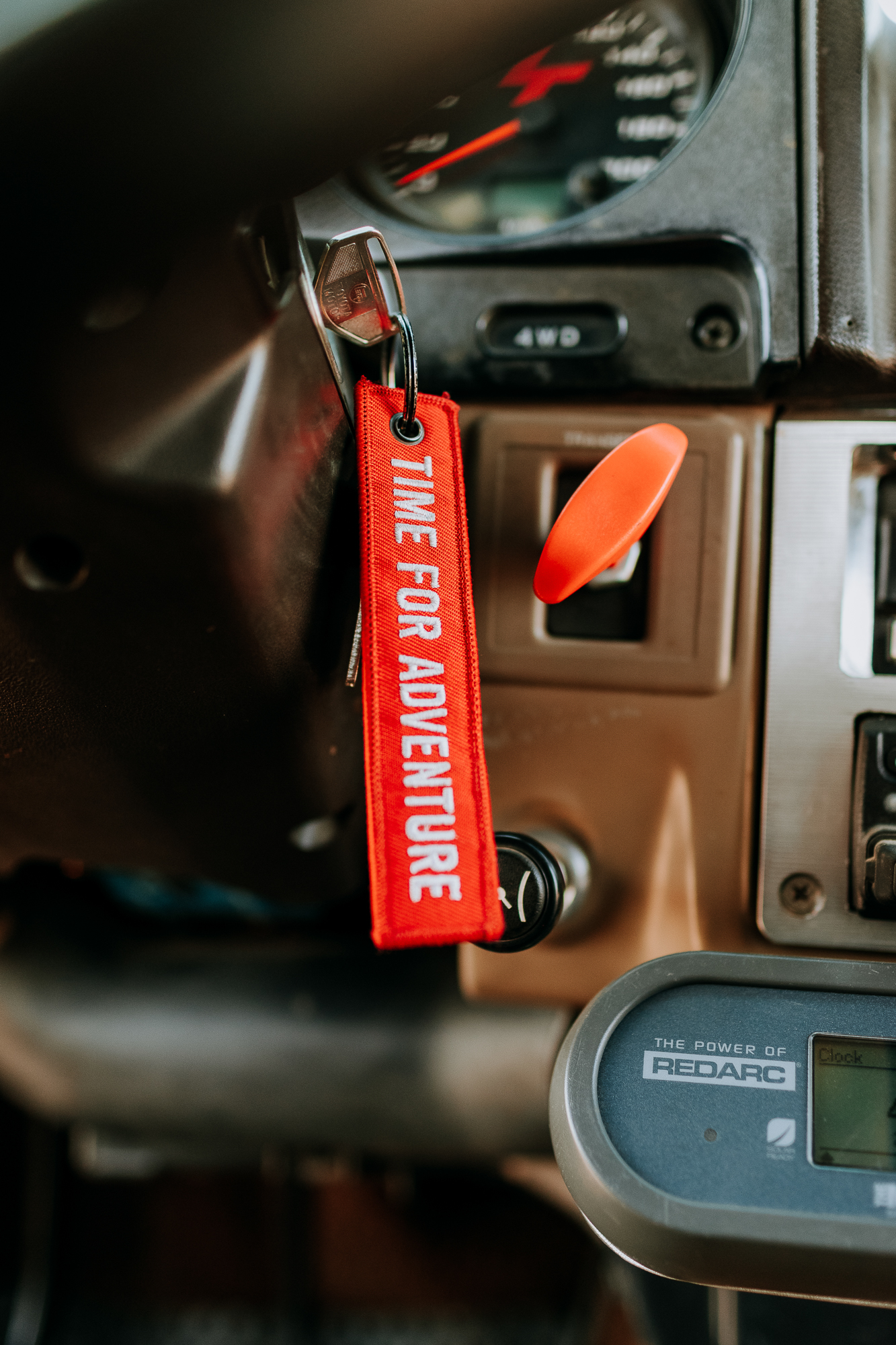
Arriving at our destination in the heart of Riyadh, I asked Luai to share some of his favorite travel experiences—interestingly, both involve extremes of temperature. His voice filters through the radio one last time. “I left during the summer, which is crazy hot here. It was 49°C, and I had some problems with my air-conditioning system. It quit 200 kilometers out of Riyadh, and I drove 900 kilometers without A/C in the middle of summer.” He says he learned an important lesson about making the best of the situation. “I started looking at heat in a very different way. It’s part of the adventure.” Another time, while camped in Saudi’s Tabuk region, he awoke to a blanket of snow covering the ground. “It was such a beautiful experience.” But, after building hundreds of modified vehicles, his takeaway is a universal one: “It doesn’t matter what you drive or what you have, enjoy it. It always comes back to that.”
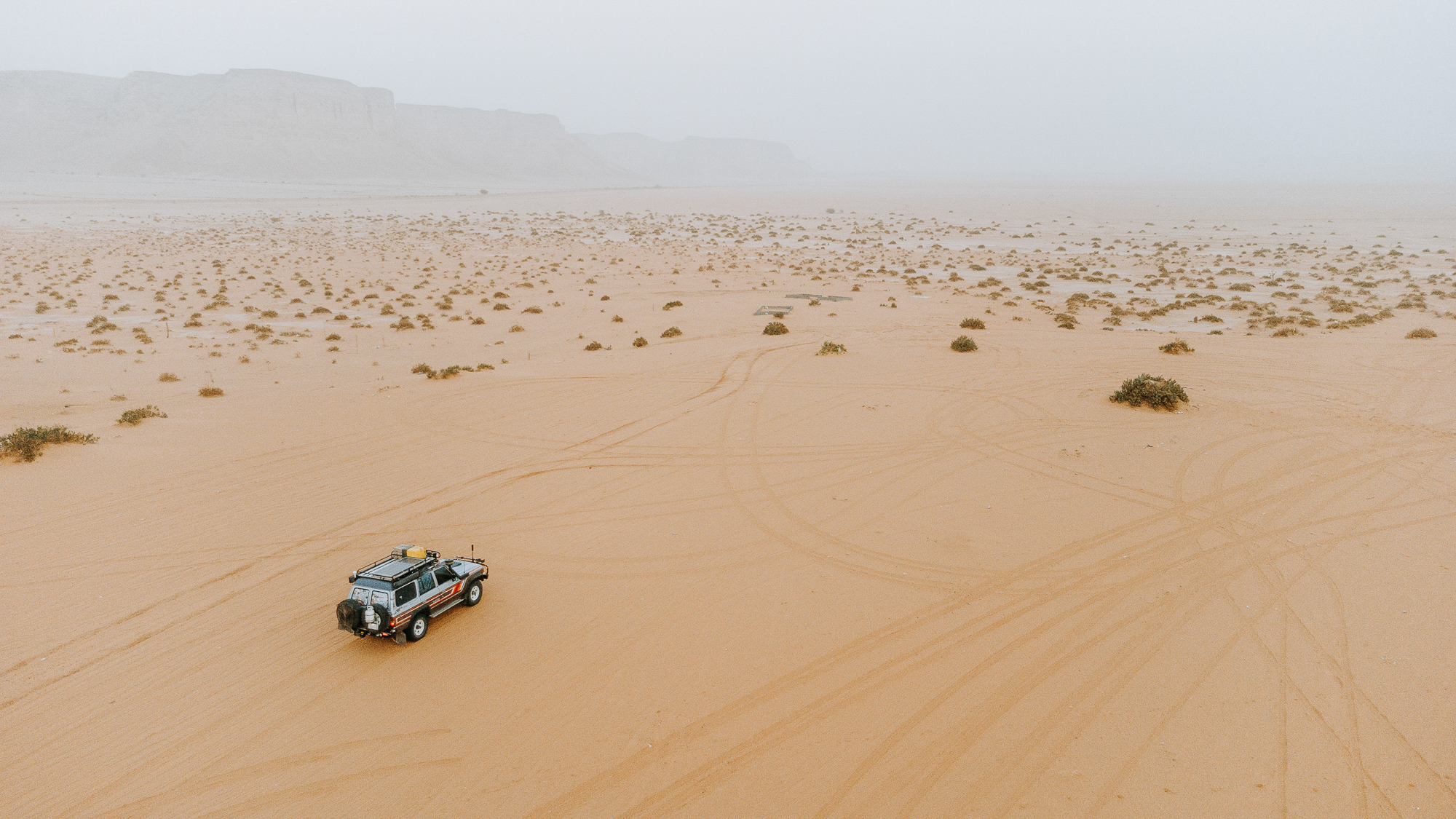
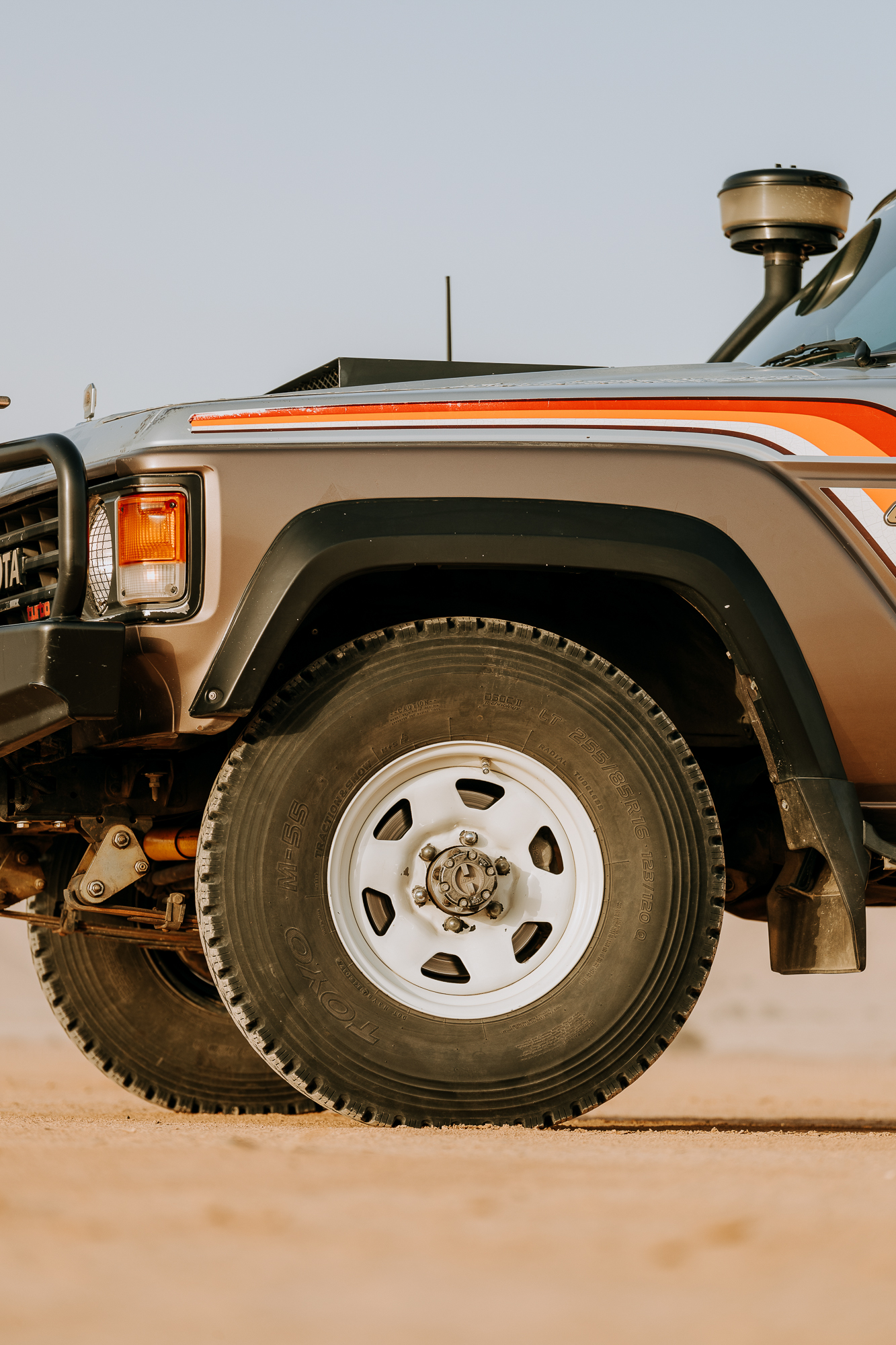

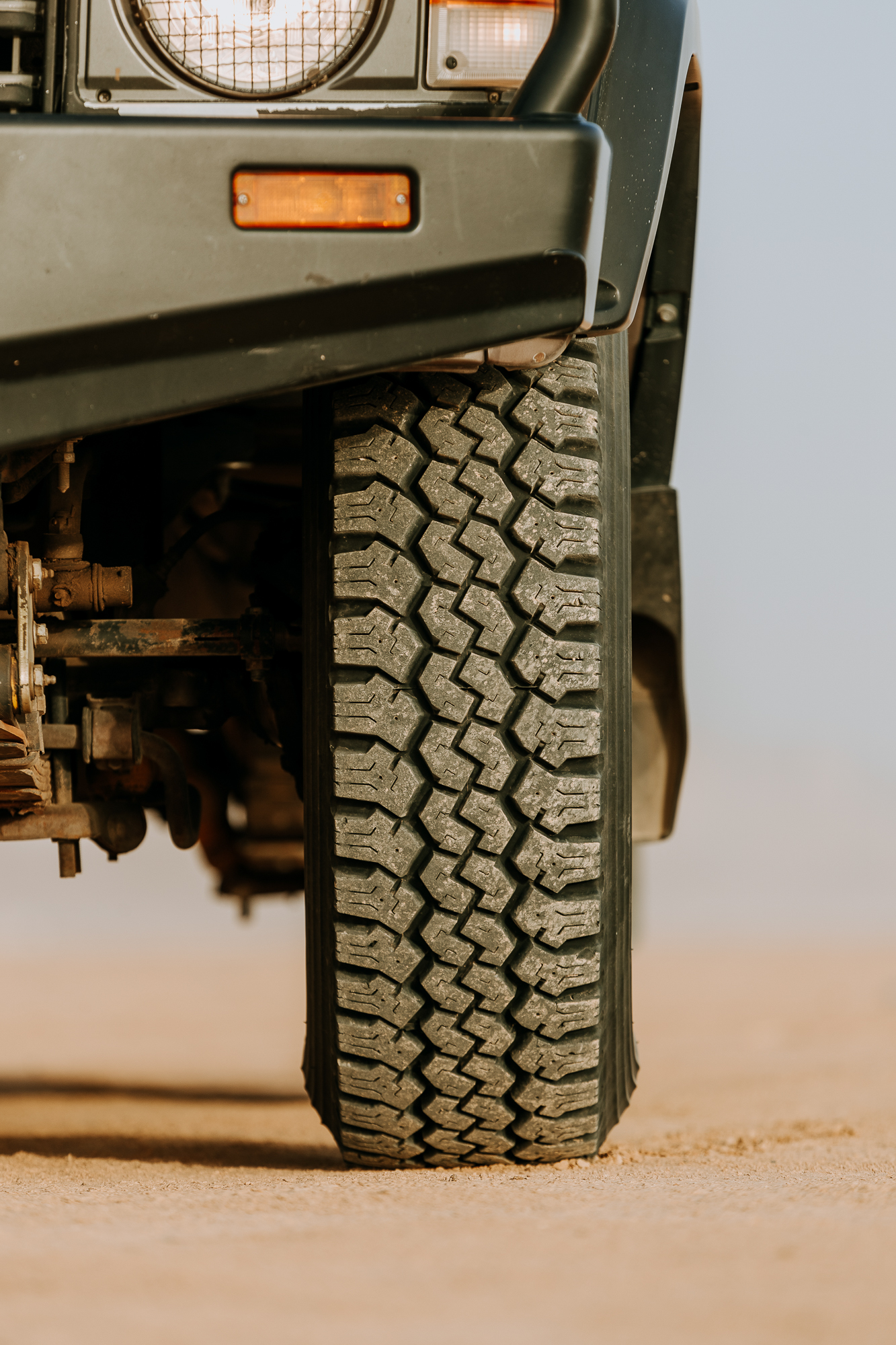
Toyota FJ62 Specifications
1985 Toyota FJ62 Land Cruiser
Power
1HD-FT turbo-diesel engine
H55F 5-speed transmission
H42 twin-stick transfer case
HPD top-mount intercooler
Suspension and Drive
4.10:1 differential axle gearing
80-Series brake booster
80-Series steering gearbox
ARB air locker, front and rear
Old Man Emu heavy-load suspension
Rear airbags
Wheels and Tires
OEM steel wheels, 16 x 6
Toyo M55 255/85R16
Recovery and Armor
ARB bull bar front bumper
Warn 8274 winch
Safari snorkel
Factor 55 recovery kit
Hi-Lift jack, 48-inch
Kaymar rear twin tire carrier bumper
Shovel
Accessories
Inti roof rack
Recaro touring seats
Galvanized steel diesel 160-liter fuel tank
On-board 200-liter freshwater tank
Pura UV water filtration system
Partner Steel Co. stove
AT Overland propane tank
Alu-Cab awning
Alu-Cab shower tent
Water-to-water heat exchanger
AT Overland Adventure Trailer with Eezi-Awn rooftop tent
Electrical and Lights
Dometic 11-liter fridge
Engel 42-liter fridge
Electric 10-liter water heater
Redarc Manager 30
Blue Sea circuit breakers
sPod switch panel
ARB compressor
Cibie 7-inch headlights
IPF off-road halogen bumper lights
Hella halogen roof rack lights
Rigid 50-inch LED light bar
Rigid LED scene lights
Two 100-amp lithium batteries
Shurflo freshwater pump
Inverter, 3,000-watt
Garmin 276Cx navigation system
Garmin GPS external antenna
Cel-Fi signal booster
Fixed 150-watt solar panel
Two Odyssey AGM starting batteries
Kenwood 110-watt high-power radio
Resources
4 Wheel Station: 4wheelstation.com, +966545045066
To learn more about Luai Alsheheli and his 60-Series Land Cruiser, please enjoy Episode 87 of the Overland Journal Podcast.
Our No Compromise Clause: We carefully screen all contributors to ensure they are independent and impartial. We never have and never will accept advertorial, and we do not allow advertising to influence our product or destination reviews.
Read more: The Kingdom of Saudi Arabia, a 3-part Video Series


